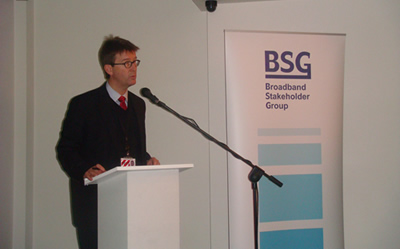September has been a busy month in the world of next generation broadband. Government reviews, UK and EU regulatory consultations, not to mention our report on the cost of fibre-based next generation broadband, have certainly moved the debate on in the UK.
The month started with the BSG publishing its report ‘The costs of deploying fibre-based next generation broadband‘. This report used geographic and cost data specific to the UK, allowing us to model the cost of deployment across a variety of geotypes. The long and the short of this is that the report suggests that fibre to the cabinet will cost up to £5.1bn, and fibre to the home up to £28.8bn.
The total costs are interesting, but the purpose of the report was to breakdown the various cost components, to examine where the real costs lie. Unsurprisingly, this was in the civil infrastructure elements of the network – 42% of total costs for FTTC, and up to 80% of total costs for FTTH. Any steps that could be taken to reduce these costs would obviously help reduce this barrier to investment, and the report modelled how various actions, such as if higher duct re-use was possible, would impact the overall costs.
The report also clearly set out that there is a definite difference in the cost of deployment between urban, rural and remote areas of the UK. For fibre to the cabinet, for example, the cheapest 58% of households would cost £1.9bn to deploy to; the next 26% would cost £1.4bn, and the most expensive 16% would cost a further £1.8bn. Clearly, deploying beyond the first 60% of UK households will be a more challenging case for investors to make, which has a number of implications for government and the regulator.
This was closely followed by the launch of the final report of the Caio Review – ‘The Next Phase of Broadband UK: Action now for long term competitiveness‘. The Review suggested that, while we shouldn’t be panicking about a lack of NGA in the UK, the government could take actions to reduce the barriers to investment, and set out the need for leadership from the government and the regulator. A range of initiatives were recommended, including providing certainty for investors and reducing the costs of deployment, while increasing the competitive pressure on copper-based services, and benchmarking our performance against other countries while considering the ‘batstop’ remedies should the market fail to deliver NGA.
We welcomed these recommendations at the time, and look forward to hearing the government’s response to the Review. Certainly, our reports over the last 18 months have supported the conclusions and recommendations of the Review.
What followed was then followed by a flurry of regulatory activity. First, the European Commission set out its long-awaited draft Recommendation on the regulation of NGA. The Recommendation sets out how the Commission would like regulation to support investment and competition in next generation broadband, and makes for interesting reading for Ofcom and the operators, who will no doubt be submitting their views to the Commission before the 14 November deadline.
This was swiftly followed by Ofcom themselves publishing their latest consultation on the regulatory environment for NGA, ‘Delivering superfast broadband in the UK‘. The consultation discusses a range of issues and, although differing in depth of detail across the issues, certainly moves the debate on from its previous consultation last September. Positioning itself as a ‘framework for action’, the regulator will further progress these issues through a range of activities with stakeholders.
And, just to add to the fun, the Commission has also now begun its second periodic review of the Universal Service Directive, as well as launching an EU-wide broadband performance index.
Quite a lot to absorb for those of us who spend their days working on next generation broadband. So where has it left us? Well, the Caio Review has set out a number of options for government if it is serious about trying to reduce the costs of deployment. The government response will be interesting, and whether they are actually able to implement some of the suggested changes (such as to the way fibre is treated in the rating system) is up for debate. Caio’s recommendation that government and the regulator take a strong lead on NGA is one that we support, and are keen to see.
Our report has added further to the evidence base for policy making that we are committed to creating, to ensure appropriate policy is developed. It adds numbers to views that were likely already held, but also raises interesting questions, and the granularity of our figures should be of real use to those interested in local or regional broadband projects.
The Commission’s Recommendation, and Ofcom’s consultation, take us closer towards regulatory certainty than we were before, although a number of questions remain unanswered and this is unlikely to be the end of Ofcom’s process for creating the right regulatory framework. Certainly there could be a sense that every time you delve deeper into an issue, the list of questions a regulator needs to answer gets longer.
One issue worth noting is the change of view towards public sector projects. Sympathies certainly appear to have shifted within Ofcom, and possibly within BERR given the Review’s recommendations, since the DTI/Ofcom Best Practice Guide for Public Broadband Schemes was put out in 2007, and this is a welcome development.
This is one of many issues raised this month, however, and stakeholders will be watching with interest to see how these are played out in the coming months.

